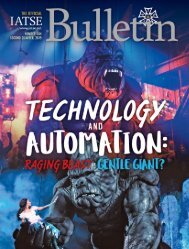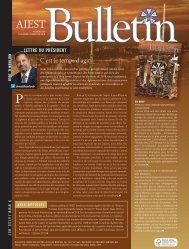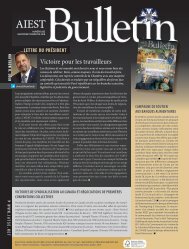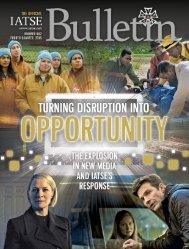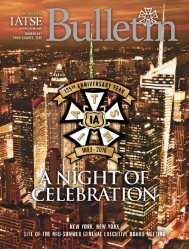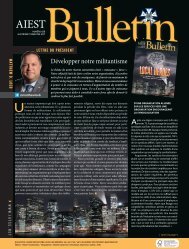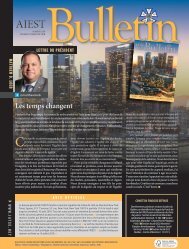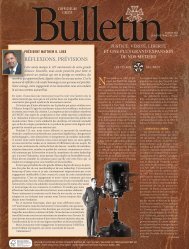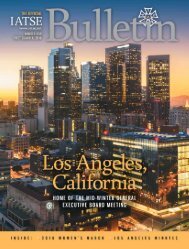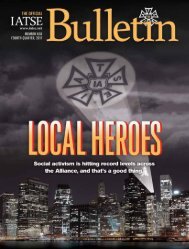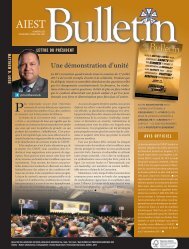IATSE-2nd2018_web
Create successful ePaper yourself
Turn your PDF publications into a flip-book with our unique Google optimized e-Paper software.
to start rebuilding its theater community throughout the next<br />
fifteen years. The biggest push came in the mid-1980s and <strong>IATSE</strong><br />
members, as well as Canadian actors, directors and writers were<br />
ready to step in.<br />
The result of that support and commitment can be seen<br />
decades later in Canada’s thriving legitimate theater industry.<br />
In Ontario, summer festivals such as the Shakespeare festival in<br />
Stratford also provide work for IA members. Ironically, a high<br />
percentage of theatergoers include more than three million<br />
tourists, many of them American.<br />
The strong connection to the performing arts has ensured a<br />
place for Canadian theatre in the hearts of the nation’s citizens.<br />
It also ensures continued work for <strong>IATSE</strong> members, whose skills<br />
and craftsmanship are welcomed by the thriving Canadian<br />
theatre community.<br />
THE BRITISH INVASION<br />
In the 1970s, <strong>IATSE</strong> members in New York were caught<br />
up in the decline of Broadway, while their brothers and sisters<br />
working on stages across the U.S. and Canada were doing a<br />
little better thanks to the success of the road shows of past<br />
Broadway hits. Then, in 1971, the first wave of the British<br />
invasion came ashore in the form of Jesus Christ Superstar.<br />
This marked the first appearance of Andrew Lloyd Webber,<br />
the young Englishman who would transform musical theater<br />
and Broadway with it. With these new shows, staging and<br />
dramatic special effects became as important as songs and<br />
book, dialogue and direction.<br />
Once again, <strong>IATSE</strong> members found themselves caught up<br />
in a rapidly changing and evolving industry as they were called<br />
upon to create and execute elaborate staging, lighting and sound<br />
design, helping to make this and other shows successful even<br />
when critics disapproved.<br />
ON THE CUTTING EDGE OF<br />
CHANGE IN THE EIGHTIES<br />
Legitimate theater in the 1980s continued to be dominated<br />
by economics. Too often, both dramatic and musical shows<br />
closed after a single performance because their producers<br />
were afraid to risk future expenditures on anything other<br />
than a sure thing. Thus, there were few long-running hits.<br />
The era of the modern spectacle would culminate in 1988,<br />
with the arrival of yet another Lloyd Webber production, The<br />
Phantom of the Opera, with advance sales of more than $16<br />
million. The show attracted such attention and interest that<br />
it virtually dominated the theatrical season — and it revived<br />
interest in the legitimate stage.<br />
Phantom used every effect available to recreate the misty<br />
waterways of the Paris sewers or the city’s nighttime skyline.<br />
Alliance carpenters constructed the interior of the Paris Opera<br />
house complete with box seats and grand staircase. They built<br />
a tilting bridge and a massive grid that could fly up or down<br />
but still be strong enough to support the weight of actors<br />
climbing on it. Special effects included pyrotechnics of every<br />
sort. Computers, operated by stagehands, controlled props and<br />
equipment ranging from the phantom’s boat to the candelabra<br />
that swept in and out and up and down the stage. It was<br />
theatrical spectacle at its finest.<br />
The heightened importance of automation in the<br />
theater could have left members behind, had not <strong>IATSE</strong><br />
made such a strong commitment to education and training.<br />
By continuously enhancing members’ technological skills,<br />
becoming fully conversant with new technologies as soon as<br />
they are developed, we have been able to protect our position in<br />
the theater industry. Indeed, this versatility and ability to adapt<br />
to the demands of the workplace — at an extremely rapid<br />
pace — has earned <strong>IATSE</strong> the respect of theater managers and<br />
producers worldwide.<br />
52




